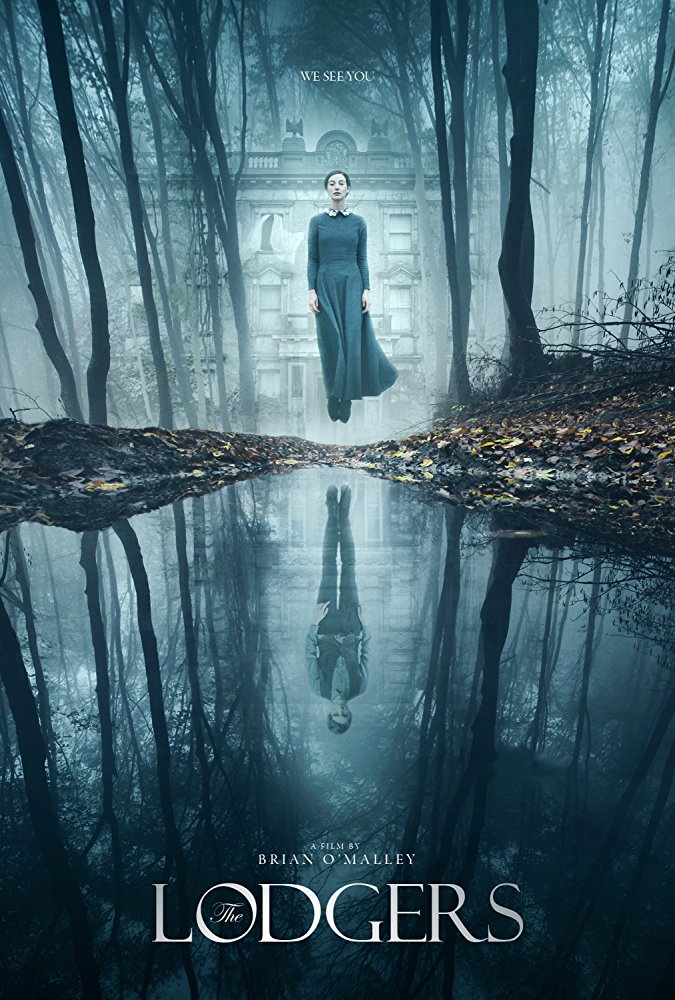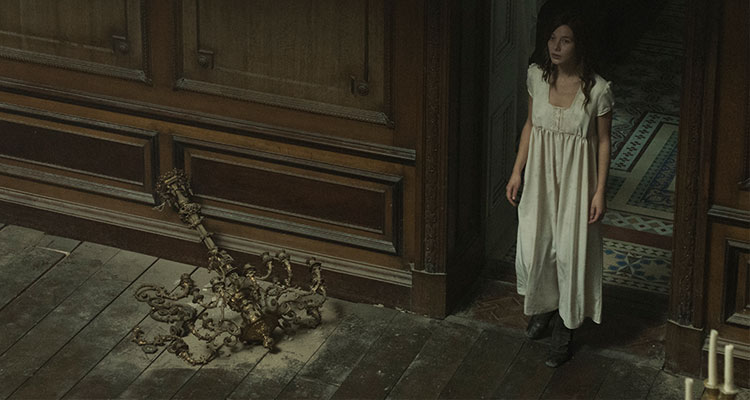Opening in Irish cinemas on March 9th, The Lodgers is a horror movie from Irish director Brian O’Malley and writer David Turpin. The film is set against the backdrop of the Irish War of Independence in 1920s rural Ireland. Anglo Irish twins Rachel and Edward share a strange existence in their crumbling family estate. Every midnight, the mansion is haunted by the sinister presence of The Lodgers, who enforce three rules upon the twins: they must be in bed by midnight, they may not permit an outsider past the threshold, and they must always stay together. When troubled war veteran Sean returns to the nearby village, he is immediately drawn to the mysterious Rachel, who in turn begins to break the rules set out by The Lodgers. The consequences pull Rachel into a deadly confrontation with her brother and with the curse that haunts them.
Congratulations on ‘The Lodgers’… how did the project begin?
David Turpin, the writer of The Lodgers, grew up in a house that was divided into flats. He used to play games where he would imagine sinister figures who also lived in the building would enter his home whist he was sleeping, and live in his house after midnight. That idea hung around in the back of his mind for years he was asked to write a ghost story by Tailored Film, it quickly came to the fore and evolved into the film you see today.
Was it difficult to get funding for an Irish horror film?
The Irish Film Board are very supportive of genre cinema, and so they treat it very much as they do any other film – the screenplay has to be excellent. After that its a completely open playing field and now is a very good time to make horrors in Ireland. With The Lodgers we had a beautiful screenplay from David Turpin, which Producers Julianne Forde and Ruth Treacy of Tailored films then went about pitching to various potential international investment partners. With the Irish Film Board having an excellent reputation world wide this puts any project they support in a very strong position. Thankfully Epic Pictures in LA loved the screenplay too and came on board to close the remaining funding. It was a long process, around 18 months in total, and regardless of how well the film looks, it was made on a very low budget for a period genre film. The challenge with horror is the same as any genre – finding a good script – but its the key that opens the doors. If you’ve got a good script or story, and a bunch of smart people willing to make it, the Irish Film Board are very receptive to any and all forms of genre. So start writing!
What was the casting process like to find twins Rachel and Edward? Were you always looking for a resemblance of sorts?
The casting of the Lodgers began with Rachel. As she is the central character we knew we had to find her first, and then find Edward. Charlotte walked in the door with dark skin and white blonde hair, looking nothing like Rachel, however her mesmerising performance quickly won us all over and she was cast. We then set about finding an Edward, keeping a completely open mind about what his colouring might be. The script called for dark hair, but if they both were blonde that would have its own strange quality too.
When I first read the script I immediately thought of Bill Milner as I was such a fan of him in Son of Rambow. Now 21, and with a striking physical appearance, he seemed perfect. And indeed he was. We put him and Charlotte in the room together and the chemistry was electric. So we knew they were our twins, but how do we make them resemble each other? Initially I imaged we’d dye his hair blonde, and make them resemble each other that way. But that colouring wasn’t going to suit him so it was decided that Charlotte would dye her hair dark. I recall some concern that they didnt particularly look alike, but I was convinced if we told the audience they were twin brother and sister, and they acted like twin brother an sister, then that would be enough. And sure enough its never been questioned. I think the fact that Bill and Charlotte quickly developed a strong bond prior to the shoot meant there was a genuine connection going on that permeates their performance and makes for a convincing pairing.
Writer David Turpin is also composer on the movie, did he have any idea of how he wanted the score to sound or was that a collaborative process?
David is an immensely talented musician with a very particular sense of taste which is present in both his written work and his music. Its something I’m very drawn to and which I respond to on an emotional level. So for me it was a case of giving him and Stephen Shannon his writing partner on the film some guidance and then the freedom to take the score beyond what might be expected. They then created a beautifully delicate score which feels like the perfect companion to a period ghost story, but still feels contemporary. Its a thing of strange beauty.
You wrote the screenplays on your previous 3 projects, have you been writing another movie or looking out for scripts like ’The Lodgers’ to come along?
I wrote the screenplays for my two short films, but I haven’t had one of my feature scripts produced yet. I had been working on a number of projects but I was also looking for something closer to production that i could get attached to as director. Having just made Let Us Prey, which had given me a lot of positive attention, I felt it was important that my second film remained under the umbrella of horror so I could utilise that attention further. I was in search of something that would satisfy that whilst avoiding making something that would see me typecast as a director of hardcore horror. Ruth Treacy and Julianne Forde of Tailored films were seeking a director for their period ghost story and having seen Let Us Prey at a festival in Montreal asked me if I’d like to take a look at it. They weren’t aware that gothic period ghost stories are probably my favourite sub-genre of horror, so as soon as I read it, The Lodgers was a film I wanted to be involved with.
You shot the movie in some unusual locations like Loftus Hall… How was that for shooting?
Loftus Hall is a living museum, so shooting there required caution at all times. Its a remarkable space, but tis also delicate, so anytime you enter a space you have to consider is anything you plan to do going to put the walls or floors under stress. This took some getting used to, but we eventually realised that we just had to consider every wall and floor precious, and treat it accordingly. The crew were incredibly respectful and for the most part it didn’t create any problems. Thankfully Loftus Hall is such a remarkable location that even with practical limitations, creating beautiful images was an absolute joy, with every room presenting stunning lighting and framing opportunities.
Was it difficult to get permission to shoot at this infamous location?
Loftus Hall is owned by Aidan Quigley, and its he who decides if you can shoot there, or not. Thankfully he loved the screenplay and felt it perfectly represented what the house stood for. So we were the first film allowed inside his doors. I consider it a real honour to have shot the first film in Loftus Hall. Its something I’ll carry with me for the rest of my life. Its the most remarkable space I’ve ever film in.
Did you have to dress the locations or were they suitably spooky?
The house is naturally spooky, but production design Joe Fallover had to do a fair bit of work to get each space working for our story. He added cobwebs and debris all around the house. giving the impression of a home that was no longer being maintained The dining room had to be completely dressed, a fireplace added, and all the windows boarded up to create the impression of decaying grandeur. The bedrooms were all completely dressed from scratch as they were being used as storage rooms up until then. And the whole area at the base of the stairs, including the trap door and water mechanism has to be installed. This was incredibly complex as any water leaks would have destroyed the very expensive intact floors on either side. So whilst the house as a space is very much as it appears in the film, there was a great deal of work involved in making it right for the story we needed to tell.
What films, writers and directors have influenced you?
I first learned how to direct by watching Once Upon a Time in the West by Sergio Leone. Its a film school in three hours and I think theres no doubt my love of music and how it interacts with the camera comes from Leone. Other directors I hugely admire, and who’s work gives me great inspiration are Michael Mann and David Fincher. They both have a very considered approach to cinema, where nothing is left to chance, and that makes for films where the hand of the director is very apparent. This is something I find very exciting, not just as a viewer but also as a director. I dont enjoy drama that feels like it was shot wide, mid and tight, and then created in the edit. I like a film to feel like there is a hand guiding it, and a plan that will slowly reveal itself. This is why the likes of The Cohen Brothers or Scorsese make movies that continue to enchant people for decades. Because each time we watch them they reveal something new, and this cant happen without a pre-conceived plan. Unless you’re David Lynch of course…..
What do you think of the popularity of horror at the moment with films like IT becoming massive box office hits?
I think its great. IT and Get Out are the exception rather than the rule, but they have proven that horror doesn’t have to be the strange child you hide in the back room. It can be welcomed into mainstream cinema. And in some cases, it can make a lot of money. This can only be a good thing. Like any success, there’s bound to be a glut of bad attempts to cash in on it, but with studios seeing horror as something that can exist in the mainstream its a very exciting time to be a horror writer or director.
What advice would you give to upcoming film makers?
Listen to everyone, and then take all the good ideas. You’ll get the credit anyway.
You’ll also get all of the blame for the bad ideas, but that goes with the territory.
Finally, whats next for you?
I have several films in development and like any director, I’m happy for any of them to happen next. One of them is a gothic horror film written by Tony Philpott and produced by Fantastic Films. And I’m also involved in developing and pitching on a number of Science Fictions. Science Fiction is probably my favourite genre, but probably also the hardest as it requires a really original idea. And thats the hard part.
THE LODGERS is at cinemas from March 9th




